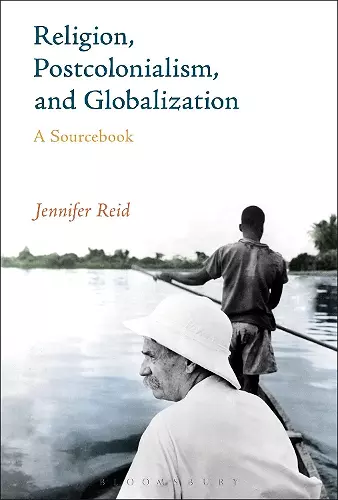Religion, Postcolonialism, and Globalization
A Sourcebook
Format:Paperback
Publisher:Bloomsbury Publishing PLC
Published:18th Dec '14
Currently unavailable, and unfortunately no date known when it will be back

A much-needed Sourcebook on globalization and colonialism from a history of religions perspective, tracing back to the voyages of Columbus.
Religion, Postcolonialism and Globalization: A Sourcebook shows how the roots of our globalized world run deeper than the 1980s or even the end of WWII, tracing back to 15th century European colonial expansion through which the 'modern world system' came into existence.
The Sourcebook is divided into four sections, each with a critical introduction by the editor, a series of readings, and discussion questions based on the readings. Canonical readings in religion, globalization and postcolonialism are paired with lesser-known texts in order to invite critical analysis. Extracts explored include work by Max Weber, Edward Said, David Chidester, and Kant, as well as political documents such as the British Parliament's 1813 Act regarding the East India Company. Sources range from the origins of the common phrase "jihad vs. McWorld" in the work of Benjamin Barber, to personal essays reflecting religious responses to globalization.
Focusing on a history of religions approach, Religion, Postcolonialism, and Globalization provides an alternative to existing sociological work on religion and globalization. Guidance on useful web resources can be found on the book's webpage.
The Religion, Postcolonialism and Globalization sourcebook is an invaluable resource for anyone who wants a better understanding of relationships between religion and the development of the modern world. For teachers this sourcebook clearly directs students attention to the 'Doctrine of Christian Discovery' as the basis of globalization. The consequences of this Doctrine to communities around the world after 1492 gives students a deeper and more profound appreciation of the world that they currently inhabit. It is already a required textbook in my religion and colonialism classes. * Philip P. Arnold, Associate Professor of Religion, Syracuse University, USA *
Think we've moved beyond multiple colonial contaminations in our globalizing world? Think again! Read Jennifer Reid's invaluable record of how philosophical and vehement religiosity, the long events and tentacles of colonial domination infiltrate our dreams of globalizations and new agendas. Read of the many directions, writers and cultures from which come the justifications for and critical insights against the trauma of frontiers, cosmic cities, hearts and bodies. -- Davíd Carrasco, Neil L. Rudenstine Professor of the Study of Latin America, Department of Anthropology, Harvard Divinity School, USA
This sourcebook edited by Jennifer Reid lays the groundwork for a serious historical and religious discussion of the practical and discursive meanings of globalization. Her narratives and the informative articles move the meaning of globalization beyond the limited economic focus and reveals the wide range of implications evoked by the terms of the title. The sourcebook opens the concepts and practices of all the Human Sciences for radical interrogation and critique. This is an important and needed addition to an important cultural inquiry. * Charles H. Long, Professor Emeritus, History of Religions, University of California, Santa Barbara, USA *
While books about globalization are abundant, one that considers the dynamics of trans-cultural interactions and global relationships of exchange as “a fundamentally religious phenomenon” cuts new ground. In that sense—and others—Jennifer Reid’s sourcebook both alerts us of a gap in conventional ways of thinking about the reciprocal if invariably asymmetrical relations among persons and communities from different parts of the world, and then works to fill that gap. Providing a long and wide view of globalization and religion, both of which are broadly but very carefully conceived, the reading selections are ample and strategically made; and the associated commentary on those readings is provocative and well formulated in ways that holds open a range of different conclusions. To be sure, this sourcebook is a very welcome addition to the landscape of both globalization studies and, even more, religious studies. * Lindsay Jones, Professor, Department of Comparative Studies, The Ohio State University, USA *
Jennifer Reid’s sourcebook is an important project, worthy of a wide and mixed readership: it is sophisticated in conceptualization; creative in organization and categorizations; and smart and strategic in selection of sources. It provides for the student interested in the construction of the modern world a fascinating window onto the profound and complex representations, functions, and effects of “religion.” I recommend this book with enthusiasm, and predict that it will for some time be a focal point in serious discussions about a wide range of topics and issues deemed compelling. * Vincent L. Wimbush, Director, Institute for Signifying Scriptures, USA *
ISBN: 9781472586094
Dimensions: unknown
Weight: 376g
264 pages